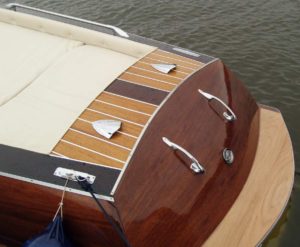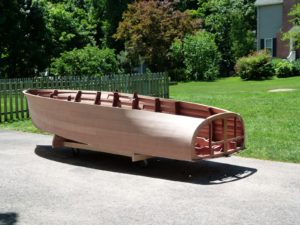WARNING – This is a long post.
Something Dad used to say came into my mind yesterday, a variation on Voltaire’s wisdom:
“Don’t let perfection get in the way of your best!”
He used to tell me this especially while I was stymying myself by procrastinating on this or that. His words resonate today, even while I’m doing something completely unrelated and not sanding decks, busy varnishing transoms or painting waterlines.
Effort isn’t easy. Change isn’t ever easy. These don’t seem to ever get any easier with practice, either. While it’s true that some struggle more than others, whether we like it or not, change is the only thing that we can count on to stay the same.
Perhaps this is why, when so many of us choose to go to battle with change, it baffles some of us that it isn’t more a fundamental building block of everything we do. While making friends with it might not be the easiest thing to do, resisting it is arguably even more difficult, not to mention way less fun.
Sometimes, out-of-context, I remember other phrases Dad had. He left me with a hefty-sized bag of tricks for approaching change and the effort therein. When that particular memory took hold of me yesterday, the unexpected daydream uncovered even more I didn’t know I still remembered.
Please pardon my stream-of-consciousness-form – I wrote this down once, quickly to get it out, only loosely grouped in a way that might make sense in multiple contexts:
Progress not Perfection
 Growing up, Dad always put me to work on his projects, mostly restoring vintage, collectible wooden boats, which required countless hours of repetitively sanding teak decks, patiently varnishing mahogany exteriors, meticulously painting their waterlines once every season and so much more. Even as an 11-year-old, I’d say things like, “It isn’t going to be perfect, Dad.” He’d always answer,
Growing up, Dad always put me to work on his projects, mostly restoring vintage, collectible wooden boats, which required countless hours of repetitively sanding teak decks, patiently varnishing mahogany exteriors, meticulously painting their waterlines once every season and so much more. Even as an 11-year-old, I’d say things like, “It isn’t going to be perfect, Dad.” He’d always answer,
“I know. Do your best!”
Refinement is a part of the process, too. Getting it exactly right doesn’t happen while we are first building or changing whatever it is we are building or changing. In time, we’ll have a chance to refine our initial framework. It’s important for us to focus on our progress, rather than whatever might not be right. We’ll get there.
Dad liked to say,
“As long as we know we did our very best, we’ll believe in it with our whole heart.”
After our earnest labors, we’d walk around the finished product, reluctantly finding inconsistencies. Nonetheless, we were still satisfied because we knew it in our hearts. We’d done our best. How the air cured it or how the grain ran with respect to the gleam of chrome, the light, so many things were out of our control and together we learned to let them go and to be grateful for our efforts to get as close to perfection as we could.
What was always also satisfying later on, something we couldn’t know until we had some experience, was knowing that no one else noticed the things we did. Fussing over them was an exercise in futility, better replaced by being open to the final product, which was
“Always in line with something larger.”
Dad liked to say that a lot.
One Thing at a Time
Back to the restoring-the-boat analogy, again: Dad used to say,
“Try not to start thinking about that next step unless it relates to what you’re doing now. Otherwise, you’re cheating yourself out of doing your best at the task at hand. Each step deserves our undivided attention.”
Creating change presents the same sorts of challenges whether on our own or in groups.
We often take on multiple changes, thinking while we are taking on one might as well take on them all.
Trying to change or figure out every challenge at the same time prevents us from focusing on one thing and doing it well before moving on to the next. Be clear about it. Allow your own and/or your team’s voice to be heard while being mindful of overload from the number of voices. Focus on one thing at a time for your own and the groups’s sanity and effectiveness. Do what you need to do to do your best on each part of the change.
 Dad would often seek the advice of seasoned woodworkers, machinists and other experts on his seemingly endless walks through marinas near and far, randomly meeting these hidden, unknown heroes who were busy solving some very niche challenges and asking them how best to go about changes large and small, all related to one restoration project or another (he often had multiple projects underway in parallel). Before setting out to replace a rib in a boat’s infrastructure, for example, Dad would make sure he had the buy-in of everyone he’d consulted, his ad-hoc team, to make sure they had the latest information and that their opinions still remained what they were when first consulted.
Dad would often seek the advice of seasoned woodworkers, machinists and other experts on his seemingly endless walks through marinas near and far, randomly meeting these hidden, unknown heroes who were busy solving some very niche challenges and asking them how best to go about changes large and small, all related to one restoration project or another (he often had multiple projects underway in parallel). Before setting out to replace a rib in a boat’s infrastructure, for example, Dad would make sure he had the buy-in of everyone he’d consulted, his ad-hoc team, to make sure they had the latest information and that their opinions still remained what they were when first consulted.
This is akin to getting buy-in for a project in a corporate culture. Dad had this to say about that:
“Garbage in, garbage out.”
Change in groups, such as developing new teams, new products or new services need everyone’s buy-in, from the top to the bottom. Larger projects require more people. Make sure the project’s tasks are well defined and matched to the best people for them.
Creating change on a small scale is challenging. Creating it on a large scale even moreso. By ourselves, there’s only so much we can do. We need to involve others and inspire them as they inspire us to see the vision through to success, along the way being generous with autonomy to solve problems using their own initiative and creativity.
It’s important to work with a mindset that everyone’s attention, focus and resources are balanced across multiple projects. We can make it work best for each person by listening to and understanding their limitations, honoring them and then defining and assigning roles and responsibilities early on enough to build confidence and trust in the project by being transparent about progress and next steps.
 Choose the Right Tool
Choose the Right Tool
Often when I would get rushed to finish a task so I could go play with pals or move on to the next thing, in my haste I would choose a tool that wasn’t exactly right for the job. On several occasions, I’d watched Dad watch me. Rather than calling it out, which he did sometimes, he’d often just wait.
He was waiting for me to learn the lesson the hard way, which I did every single time. For example, once I tried to use a misfit brush to finish the delicate and exacting pin-striping on a boat’s deck, rather than clean one of the wheels that I had neglected to clean and care for last time. Needless to say, trying to find a shortcut took way longer, was terribly frustrating and the outcome was not even close to my best.
When I climbed down, went over to him and asked him how to fix the mess I’d made, he gently hugged me and said,
“These are things we all need to learn in our own way. Choosing the right tool is an important lesson!”
Go on the Whole Ride
Dad was well-know for saying things like,
“It’s silly to think you can go on only part of the ride.”
In other words, when we set out to do something, we should be prepared for the whole ride. It’s not possible to ride part of the rollercoaster at the theme park. Same in life. When we set out to do something, whether we succeed or not, the experience is complete. We need to think about it this way because our mindset directly influences the outcome.
This is important because change almost always takes longer than we anticipate.
Vision, positive attitude and effort will move the right pieces of the puzzle into place in time.
Our first iteration won’t be perfect. Knowing we are doing our best, though, does something even more important: it starts the conversation and builds momentum.
 Learning is Doing
Learning is Doing
Dad was a believer in doing. He would occasionally read about things but his go-to was conversation, live and in-person with others who’d either succeeded and/or failed at what he was about to do. He said this a lot: “Want to get good at something? Find someone who already is and let them kick your ass at it until you are, too.”
Like change, growth is an iterative process. Doing things is how most of us learn best. Talking about it, reading about it and listening to the experiences of others are important but they are merely steps to actually doing.
“While it’s easy to stay in that mode of preparing ourselves,” Dad used to say:
“When we begin to do, we begin to learn.”
That one might be my favorite of all.
—
Throughout history our race has overcome monumental challenges through adapting to change. As humans we are singular. There are countless tales about how we are uniquely equipped with a massively powerful set of tools that enables us to do, to learn, to deal with change, through finding strength in pain, hope in the midst of adversity and making a choice to overcome these otherwise insurmountable challenges. Adapt.
So, a toast, to all of us committed to showing up + doing our best:
Perfection is not the truth. The truth is an imperfect, endlessly iterative adaptation and it is GOOD.
Cheers.